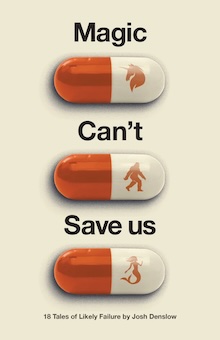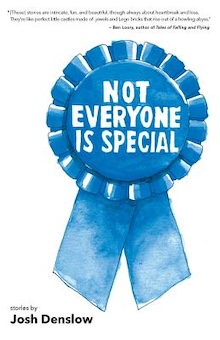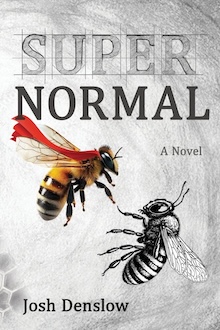
If you’re not already familiar with Josh Denslow, you should be. Denslow, author of the story collection Not Everyone is Special and the novel Super Normal, is a gifted chronicler of character-centered fiction that straddles the line between reality and fantasy. You might find a unicorn in one of his stories, but the unicorn is more likely to be in a supermarket or a restaurant than flying over a castle in some magical kingdom. His fiction thrives on exploring the tiny cracks in relationships where things can, and often do, go wrong. His new collection Magic Can’t Save Us is being published this May by University of New Orleans Press. A writer, musician, and marketing manager for Bookshop.Org, Denslow lives in Barcelona and is a longtime reader for Smokelong Quarterly.
He shared his thoughts in a recent exchange.
+
Chuck Augello: Your latest book is a story collection, Magic Can’t Save Us. If you saw someone holding a copy at a bookstore, what might you say to interest them?
Josh Denslow: I would immediately turn away and leave the bookstore so that any possible decision they could make would forever be possible. I’d never know if they put it back on the shelf or if they purchased it. In this scenario, with my back turned on the situation, I am Schrödinger and they are the cat, and for the rest of my life, both possibilities will exist. But also, this hypothetical person holding my book would then branch into two possible futures: The one with my book and the one without my book. And so I truly hope both versions of this person are happy. I hope this decision doesn’t haunt either one of them forever.
CA: Unicorns, banshees, and other such creatures are woven throughout the book. What attracts you to writing about the fantastic? How do you balance the unreal with contemporary, realistic settings?

JD: In the past, I have infused some magical realism elements into my stories, including a handful in Not Everyone is Special, my first collection. And it’s a huge part of my novel, Super Normal. But these fantastical elements have always manifested as powers that the characters had. Teleportation or flight or invisibility or something like that, and then we see how it affects their life. A lot of times, the characters in my stories who have these powers would hide them away from the world.
In my new collection, Magic Can’t Save Us, it was the first time I wrote about magical creatures where the magic and the strangeness came from non-human characters. But I attacked it in a similar way. I wanted the characters to feel real, that their problems would feel relatable, that the world where they lived felt like the one the reader was expecting, and then we’d see what happened when a magical creature appeared! It was a lot of fun for me because I didn’t know much about the magical creatures or their origins, so I could play around with the clichés and expectations that come with recognizable creatures and surprise the reader with fresh takes. And it was fun to experiment with all the ways that things could go wrong.
CA: “Silence” features a familiar set-up, a young man meeting his girlfriend’s father for the first time, but you take it in interesting directions. How do you approach making the familiar unique?
JD: I think if I intended to make the familiar unique, I would probably fail miserably. More likely, since I’m drawn to new musicians and new writers who are tweaking the rules and inverting my expectations, a little bit of that spirit finds its way into my own work. But probably even more likely, it has something to do with how I never plan ahead. I launch into each new project with no idea where it’s going to go, so most of the time, I surprise myself as well. In fact, if I don’t find myself completely turned around by an event or something a character says, then I can guess the story isn’t quite working yet.
CA: In “Infinite Possibilities Outside the Screen”, the narrator feels threatened by his girlfriend’s new co-worker, Bradley Hoof. What can you tell us about Bradley and the narrator’s reaction to him?

JD: In this story, the narrator wants to ask his girlfriend to marry him. He’s already bought a ring and everything. But he’s unable to do it because of the overwhelming insecurity he feels about whether he is a suitable match for her. And then Bradley Hoof appears. His girlfriend’s new co-worker who fills her computer screen with his handsome visage and overwhelming confidence. Since no one has ever seen Bradley Hoof outside of Zoom calls, the narrator’s girlfriend and others at work begin to speculate that he may in fact be a centaur. Suddenly our hapless narrator feels even less than before. He’ll never be Bradley Hoof. But maybe the only way to show he’s good enough for his girlfriend is to prove that Bradley Hoof is, in fact, merely human.
CA: If someone could only read one story from the collection, which one would you want them to read? Why?
JD: There is a story late in the collection called “Loss”, and it is the culmination of all the different themes I play with throughout the stories. The narrator is older, though not necessarily wiser, and he has a daughter who is herself writing a story about a chupacabra which may or may not be a veiled critique of our narrator. There is still humor, but it’s suffused with sadness as the narrator isn’t only worried about himself, but also the well-being of his child and the wife who he feels completely detached from. Since the collection itself is laid out to loosely resemble the arc of a relationship, with the stories in the first section coming at the early stages of relationships, I think it’s nice to see that by the end, the themes of loneliness and insecurity mature into something profound that can feel universal to all readers. And the living embodiment of the chupacabra breathing heavily outside their family’s home resonates in a way that surprised even me.
CA: Magic Can’t Save Us is your second collection. What have you learned about yourself as a writer since the publication of your first book?
JD: My first collection was truly that: a collection. I went through ten years of stories I’d published in print and online separately, and I strung them together like creating a mix tape. I loved that experience. During that process I learned things about myself, namely the themes and topics I returned to time and again. So for Magic Can’t Save Us, I thought it would be fun to go into it knowing that I was writing a collection. I began to think of this collection as “thematically linked” stories. No characters reappear in more than one story, but there’s a spirit here, a voice, that ties them all together. Though it took many years (a few of these stories actually almost ended up in my first collection in 2019 before I realized they were part of this new thing), I learned that I could carry something with me over time, even while I worked on other projects and novels. The stories had to speak to each other in a way that’s different than hand picking stories from stand-alone pieces. I’m extremely proud of the way it turned out.
CA: You have a BA in Film and have written several scripts. How do scriptwriting and fiction writing influence each other?
JD: Without a doubt, the biggest influence script writing had on my fiction is with dialogue. I love that dialogue can tell so much about a character even when they are talking about other things. Which is exactly what needs to happen in a movie. We can’t hear those inner thoughts, so the dialogue must carry a lot of weight. I also suspect that the pacing of scripts has influenced me too. There is such a mathematical equation to building a script. Scriptwriters count to the literal page number where certain actions should happen. I think I subconsciously still build stories with a nod toward that structure, and it probably is the reason why one of the main things I hear from readers is that my stories feel like movies. I always take it as a high complement, even if it wasn’t intended as such.
CA: On your website you mention a script entitled Potential about the Austin music scene. Is there any news about it? It’s a film I’d love to see. Tell us about it.
JD: The idea for Potential was to return to scriptwriting with a character who is a musician, not unlike me, who was a little past the time when he could ever become famous, but still struggling to include music in his life. And since I don’t usually write characters that resemble me at all, I decided it was only fair if I made things really difficult for him, which is what I do to all of my characters. So this movie version of me was suddenly facing some of my own worst nightmares. Losing his family and his sense of self and feeling like he never lived up to his potential. The interesting thing about this script is that even though I have a full draft of it, it just keeps changing in my mind as my real life goes through changes. A move across the world and the forward march of time. I’m getting older and my kids are getting older. My wife is ever more amazing. My life is lovely, so I keep coming up with new trials for my main character. Nearly once a day I think about updating the script to take place in Barcelona and how a washed-up musician tries to bring his fractured family back together. It’s almost as if the script for Potential is some strange form of the Portrait of Dorian Gray getting shaggier and older and sadder hidden away in my mind. Maybe one day someone will let me make it.
CA: You’re a prolific writer. What’s next for Josh Denslow?
JD: I’m working my way through the fourth, and what I hope is the final, draft of a middle grade novel I began when my first son was born. He’s 11 now, and even though it feels like this book has been dancing around in the background for such a long time, the timing is going to be perfect. All my children can finally read something I wrote, and they are incredibly excited. I also have a 540-page novel that I feel is the best thing I have ever written, but sadly, it is about to be shelved forever to make way for a new idea that might have better luck in the world. When they say write the book you would want to read, just know that sometimes, you might end up being the only one reading it!
+++
Josh Denslow is the author of Not Everyone Is Special (7.13 Books), Super Normal (Stillhouse Press), and the upcoming collection Magic Can’t Save Us (UNO Press). His most recent short stories have appeared in Electric Literature, The Commuter, The Rumpus, and Okay Donkey, among others. He is the Email Marketing Manager for Bookshop.org, and he has read and edited for SmokeLong Quarterly for over a decade. He currently lives in Barcelona.
+
Chuck Augello is the author of the novels A Better Heart and The Revolving Heart, a Best Books selection by Kirkus Reviews. His most recent is Talking Vonnegut: Centennial Interviews and Essays (McFarland), an exploration of the life and work of Kurt Vonnegut. His work has appeared in One Story, Necessary Fiction, 100-Word Story, Smokelong Quarterly, Ghost Parachute, and other fine journals. Visit him at www.chuckaugello.com.